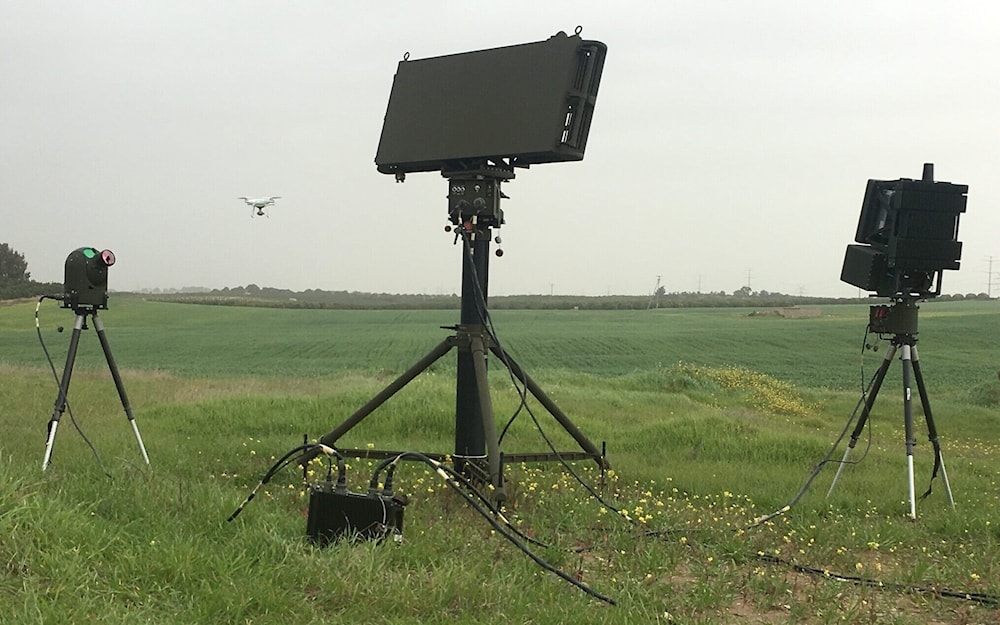'Israel' to provide Ukraine with missiles, drone alert system: Envoy
Israeli Ambassador to the United Nations Gilad Erdan revealed the Israeli occupation will be providing Ukraine early warning systems capable of detecting missile and drone assaults.
-

Drone Guard technology developed by the Israeli Aerospace Industries
The Israeli occupation is reportedly assisting Ukraine by providing early warning systems capable of detecting missile and drone assaults, according to Israeli Ambassador to the United Nations Gilad Erdan.
During a news conference, Erdan divulged that "Israel is working to provide Ukraine with early warning systems against missile and drone attacks."
'Israel' selling anti-UAV systems to Ukraine through Poland
Israeli media reports dating back to September 2022 said an Israeli arms manufacturer was supplying the anti-UAV systems to Ukraine via Poland, citing a source in the arms firm, noting that the sales were conducted through Warsaw to circumvent "Tel Aviv's" refusal to sell advanced arms to Ukraine.
The firm reportedly informed the Israeli Ministry of Security that it was selling arms to Poland, though it pretended not to know the latter was then giving the weapons to Kiev to use against Russia.
The anti-UAV systems enable their users to intercept and disrupt drones. Classified as "advanced defensive technology", the systems are not approved for sale to Kiev, though "Tel Aviv" did not seem to be interested in foiling the deal.
The Israeli occupation uses anti-drone systems around the Gaza separation wall, the Palestinian-Lebanese borders, and the Palestinian-Syrian borders, with "Israel" claimed to be one of the world's top developers and manufacturers of the technology with the involvement of various Israeli arms manufacturers, such as IAI, Elbit, and MCTECH.
Azerbaijan is among the countries that imported the Israeli anti-drone systems, using them against Armenia in the conflict over Nagorno-Karabakh. Even the United States uses Israeli technology for this purpose.
EU will need to send 20% of defense spending to Ukraine if US cuts aid
According to an EU official who spoke to The Guardian, European nations must devote around 10% of their defense budget to Ukraine for it to win, and this amount will climb to 20% if the US quits assisting Kiev.
European countries are also looking for companies that can enhance ammunition output in the short term, according to the publication.
Earlier this month, Germany's Kiel Institute for the World Economy stated that Europe would need to quadruple the present amount and timing of military aid to Ukraine to replace the backing Kiev receives from the US in 2024.
Western nations, notably European Union members, have been giving military and financial assistance to Kiev since the beginning of the war in 2022 while the Kremlin has repeatedly cautioned against this, claiming that it will lead to further escalation of the conflict.
Half of military aid to Ukraine suffer delay: Ukraine Defense Minister
Half of the military aid provided by Ukraine's allies was not delivered on time, Ukraine's Defense Minister Rustem Umerov revealed on Sunday.
Talking at the "Ukraine, Year 2024" conference held in Kiev, Umerov warned that without timely deliveries, war efforts become complicated.
Ukraine suffered a significant battlefield loss earlier this month after Russian forces took control of the strategic city of Avdiivka following weeks of heavy battles. Kiev said losing the city was primarily attributed to a shortage in ammunition, which is in great part owed to an ongoing standstill in the US Congress.
Earlier this week, Ukrainian President Volodymyr Zelensky said that Ukraine is experiencing delays in promised shipments during last year's unsuccessful counteroffensive, adding that air defense is critical to "saving civilian lives" and "strengthening our army on the frontline."
Western support for Ukraine is facing challenges as Ukraine piles growing battle losses against the Russian military. These challenges include dwindling public support in European countries due to domestic economic crises, as well as challenges in maintaining financial and military aid for the war-torn ally.
Moreover, Washington, as Kiev's primary aid provider, has encountered obstacles in renewing funds to Ukraine due to deep bipartisan divisions on prioritizing foreign assistance over pressing domestic economic and social issues. These disputes are compounded by the absence of a clear exit strategy.

 4 Min Read
4 Min Read









